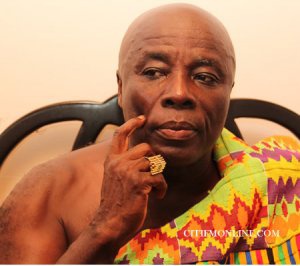The Okyehene, Osagyefo Amoatia Ofori Panyin, has scorned Members of Parliament in an exclusive interview with Citi FM faulting lawmakers for failing to “fight” widespread illegal mining – a major scourge that has left damaging and near-irreparable scars on lands and livelihoods across many mineral-rich areas of the country.
“You cannot personalise policies. You need Parliament that will run on their constituencies’ needs and wants; not on their parties needs".
He added “I expect those places where Galamsey (illegal mining) is going on to have the MPs there fight like hell because it is their constituency but they are not doing it.”
The Okyehene’s comments came after years of sustained illegal mining operations heavily polluted streams and rivers in the Eastern Region and forced the Ghana Water Company Limited to shut down its Kyebi Water Treatment Plant, cutting potable water supply to communities within the Akyem Traditional Area and beyond.
It also came weeks after extreme floods killed at least six people in seven districts in the Eastern Region and displaced nearly ten thousands residents – a disaster blamed on years of illegal mining operations, which silted the Birim River and forced it to break its banks and flood homes and farms, following 10 hours of heavy rains in July this year.
While sympathising with victims of the disaster and consoling families that have lost love ones, the Okyehene said MPs are not the only ones to blame.
He said the menace of illegal mining operations have become a problem largely due to lack of “respect” for authority and failure by authorities mandated by law to act and protect Ghana’s mineral resources failing the tax payer.
“...We grew up in this country raised by our parents to respect authority; to look up to people in authority even though if they look down on you. We were raised to say good morning and that when your father spoke that was the end. And today because of freedom of speech, because of ‘democracy,’ we don’t respect authority. President Mills had over ten times condemned these Galamsey operations, instructed several (law) enforcement (agencies) to stop it, and they are still around not doing it. So there is something that we have lost; the things that we held so dear to our hearts as we were growing up -- Hard work, honesty, discipline, sacrifices and service -- and I wonder why.”
“I wonder why now we have adopted...an eccentric value system where all we care about is showcase of images and status; my house, my care, this is me. It is killing what we held so dear. We cannot continue on this path,” he emphasized in the interview.
“Let’s have the national interest at heart and national interest means let’s do the mining when Ghana will benefit,” said the respected environmental campaigner who announced during the interview he intends “to go and talk to the President...to put a plan together now to try and recover and resuscitate the damaged places they (illegal miners) have left – pits that are killer traps for young people if they walking to their farms...”
He said, “Everybody says that well these young men and women do need a job. We have to find and way if mine is going to be the thing that are going to do, then we need to fund a way to do it properly and responsibly so we can save lives and maintain sustainable agriculture and environment.”
On Decentralisation, the Okyehene backed calls for constitutional amendment to make the position of Mayor for the various district and metropolitan assemblies an elective one, saying, “Let the people of the constituency decide who their DCE is going to be.”
He also called for a type of decentralisation that will allow “people to own their communities and systems.” He said, “Accra obviously is getting too big for AMA.
This country has gotten too big for centrality of governance. Centrality of governance is outdated. We cannot allow people to sit in Accra and control schools in Wa. People must own their own schools.
They must have the board of Education controlling their own schools, controlling curricular, doing the thing that they have to do for them to move forward.
General News of Tuesday, 23 August 2011
Source: The Globe

















